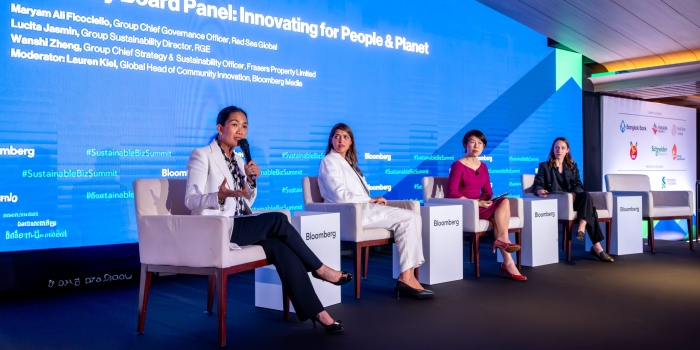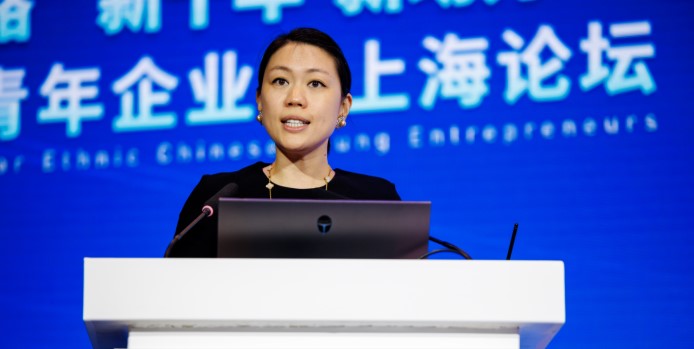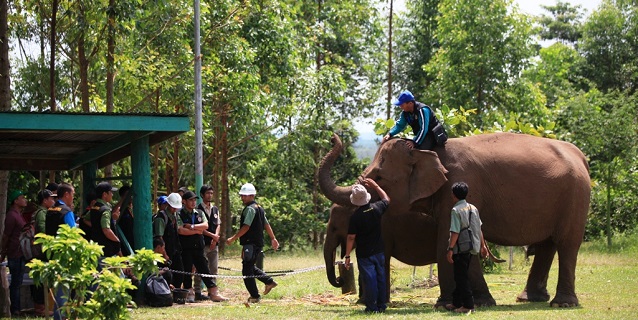The Bloomberg Sustainable Business Summit took place on 31 July in Singapore and discussed some of the most pressing sustainability issues and innovative solutions through a full day of presentations and panel discussions from prominent business leaders and industry experts.
In the panel titled “Innovating for Planet & People”, Lucita Jasmin, Group Director of Sustainability at RGE; Zheng Wanshi, Group Chief Strategy & Sustainability Officer at Frasers Property Limited; and Dr. Maryam Ficociello, Group Chief Governance Officer at Red Sea Global, shared insights on how businesses can integrate environmental and social considerations into their core strategies to drive long-term success. The session was moderated by Lauren Kiel, General Manager of Bloomberg Green.
Sustainability is an imperative
Lucita shared how RGE integrates considerations for people and the planet into its business operations, stating, “As resource-based businesses, we recognise our intrinsic dependency on nature. Therefore, we have a long-term invested interest in protecting and enhancing the health and sustainability of the ecosystems we rely on.”
Wanshi echoed this sentiment, saying, “If the societies and communities we operate in are resilient and thriving, we will do well as a business.”
Integrating environmental and social goals
Addressing environmental and social challenges requires a holistic approach that not only focuses on ecological sustainability but also promotes social equity and community empowerment. In developing economies such as Indonesia and Brazil where RGE operates, many individuals still live below the poverty line, making socioeconomic issues closely linked to environmental challenges.
Lucita commented, “A fundamental principle we adhere to is that environmental and social aspects are two sides of the same coin. We cannot address climate issues in isolation; we must recognise the interdependencies between climate, nature, and people for achieving sustainable business growth.” She explained that RGE’s business model is rooted in its 5Cs philosophy of doing what is good for the community, country, climate, and customer, and only then will it be good for the company. This integrated approach ensures that sustainability efforts are aligned with business objectives.
All RGE member companies are committed to 2030 sustainability targets as part of the group’s ESG business strategy. For example, the Sustainable Forest Management Policy implemented by APRIL in 2015 focuses on sustainable resource development through four key areas: eliminating deforestation, reducing greenhouse gas emissions, empowering communities, and investing in conservation efforts.
Lucita gave examples of successful climate actions taken by APRIL in Indonesia and Brazil, such as its 1-for-1 pledge to conserve one hectare of forest for every hectare of plantation and its Fire Free Village programme, which has in the last five years engaged 900,000 hectares of community-managed land in Indonesia, reducing the incidence of burning by up to 90%. By providing alternatives and incentives to clear land without using fire, the programme addresses the underlying socioeconomic drivers of this practice. “This is a specific example of our ability to work with communities and bring them along with us,” Lucita said.
Investing in conservation at unprecedented scale
Giving back to the land it produces from is central to RGE’s approach. The group plants an astounding 1.5 million trees every day and manages half a million hectares of conservation forests in Indonesia and Brazil – an area twice the size of Luxembourg.
Lucita shared details of RGE’s unique Conservation Levy through which it allocates US$1 per tonne of fibre to conservation. “We believe that if you’re producing from the land, you need to be able to give back to the land,” she said. This levy amounts to up to US$17 million per year spent on conservation within and beyond RGE’s areas of operation. Over the past five years alone, it has accumulated US$60 million of conservation investments.
Similarly, Red Sea Global is actively engaging local communities. As Maryam explained, the company is working to address the potential negative impacts of inflation and preparing locals for economic shifts resulting from its development projects. This includes upskilling programmes that create job opportunities and vocational training initiatives benefitting 430 students who have successfully transitioned into employment with the company or its partners.
The role of innovation in sustainability
Innovation emerged as a crucial driver of sustainability during the discussion. The speakers highlighted various innovative practices and technologies that are helping companies reduce their environmental footprint and enhance social impact.
RGE, through its agribusiness Apical, is making strides in the production of feedstock for the production of sustainable aviation fuel (SAF). Lucita cited RGE’s partnership with Cepsa in Spain to build the largest second-generation biofuels plant in Southern Europe.
Adopting a ‘waste-to-value’ strategy, the plant will utilise second-generation feedstock from agriculture waste and residue and used cooking oils, and converting them into sustainable aviation fuel and renewable diesel. The facility, set to begin operations in 2026, will produce up to half a million tonnes of sustainable aviation fuels annually. “By leveraging second-generation feedstocks, we’re not just creating new business opportunities; we’re also driving significant progress in aviation decarbonisation,” said Lucita.
Engaging the supply chain in sustainability efforts was also a focal point of the discussion. The speakers highlighted the importance of collaboration with suppliers and partners to achieve sustainability goals. “We’ve got 75% construction waste recycled into concrete panels in Bangkok, and in the UK, we recycle demolition waste into construction materials,” Wanshi added. These initiatives demonstrate how companies can work with their supply chains to reduce waste and promote circular economy practices.
A model for action
A key takeaway from the session is that companies embracing sustainability are better positioned to navigate future challenges and achieve long-term success. Lucita concluded, “At the end of the day, it’s really about going back to our purpose of being able to improve lives through our initiatives, and integrating and coming up with an integrated approach across the E and the S in our business model.” As more companies recognise the fundamental interdependencies between people, planet and business performance, RGE offers a compelling model for how to turn that awareness into action.






